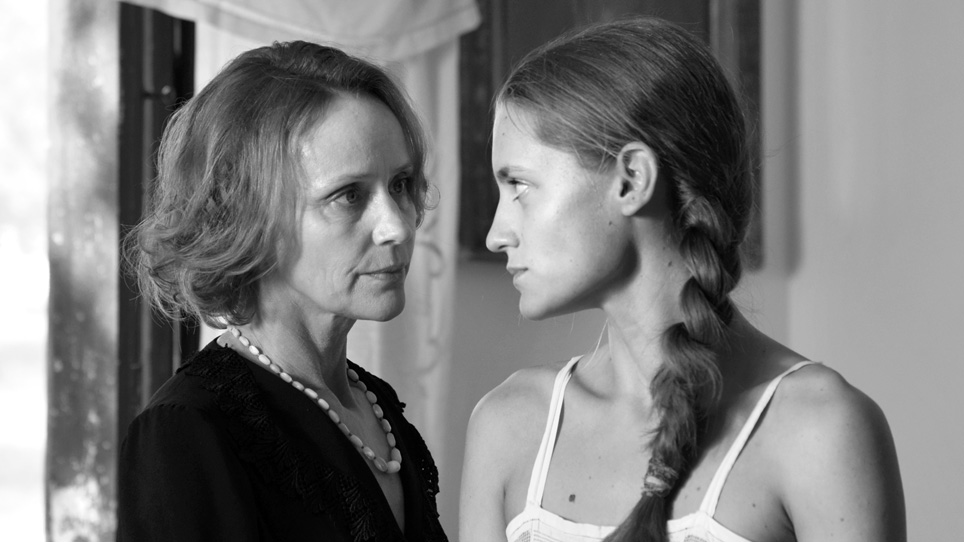
1945
Menemsha Films
Director: Ference Török
Written by: Ference Török. Gábor T. Szántó adapted from Szántó’s short story “Homecoming”
Cast: Péter Rudolf, Bence Tasnádi, Tamás Szabó Kimmel, Dóra Sztarenki, Ági Szirtes, József Szarvas, Eszter Nagy-Kálózy, Iván Angelus, Marcell Nagy, Miklós B. Szekely, Gyorgy Somhegyi
Screened at: Critics’ link, NYC, 10/10/17
Opens: November 1, 2017
When two Orthodox Jews, Sámuel Hermann (Iván Angelus) and his son Sámuel Hermann fia (Marcell Nagy) walk into a Hungarian village in 1945, people everywhere stare at them, wondering whether these two are the Jews whose pharmacy was taken over by Christians István (Péter Rudulf) and son Árpád (Bence Tasnádi) and whose comfortable home was commanderd by Bandi (József Szarvas) and his wife Kustár Andrásné, who have kept the menorah and Jewish Art. While some residents might not know the recent history of the village and look upon the two visitors as simply strange intruders, others had more materialistic worries in mind. European history notes that when Nazis removed Jews from cities and villages and sent them to the camps, their property was not put into storage, but was transferred to Christians, some of whom feared their status as legal owners would come up short when the original deeds were produced. This theft of Jewish property became one of the reasons that Jews returning form the camps to Poland, for example, led to the execution of some hapless survivors just after the conclusion of World War 2.
“1945,” filmed by Elemér Ragályi in black-and-white with a sad musical score by Tibor Szemzö, comes across as a faithful recreation of a peasant community, in this case with a whorish young woman Kisrózxsi (Dóra Sztarenki) who enjoys a conjugal visit with her former fiancé Jancsi (Tamás Szabó Kimmer) on the very day she is to marry Árpád, the pharmacy manager. In fact some residents actually feel remorse, in one case overwhelming, by Bandi, the town drunk, who had years ago ratted out the Jews to the Nazis.
While the overriding theme involves the various feelings that townspeople have toward two they consider interlopers from another world, director Ferenc Török indulges in a terrifically nuanced look at what could be a typical Eastern European village from another time. The tensions felt by the residents are in many ways not unlike those that anxiety-filled urban people must contend with—envy, resentment of those they consider better in some ways, though occasionally even some friendliness. Bandi—who orders brandy by the bottle in part because he’s the town drunk but in this case to cover up his remorse at cooperating with the Nazis—might be almost as willing as the young pharmacy manager to permit some justice by giving the returning Jews the property that is legally theirs. Some mystery is provided not only to the villagers but to us in the theater audience about the wooden crate that the visitors are transporting to the site of their previous home. The rumor is that they are carrying perfume and creams to restock the pharmacy, the very store that convinces pretty Kisrózsi to abandon her muscular boyfriend for the life of a merchant, which she would acquire through marrying the schlubby son of the town clerk and magistrate.
Director Török is well known in Hungarian film circles, though you might not guess he would direct a serious film like this given his 2001 “Moscow Square,” about high school kids who don’t give a hoot about Hungarian politics as they are into parties, girls, and graduation. With an adaptation of Gábor T. Szántó’s short story “Homecoming,” this latest venture is targeted to cinema buffs who do not require fast action but often prefer a meditative, thoughtful, deeply-felt story. The film played at several international festivals and took a prestigious award at the Jerusalem Film Festival.
In Hungarian with English subtitles.
Unrated. 91 minutes. © Harvey Karten, Member, New York Film Critics Online
Comments, readers? Agree? Disagree? Why?
Story – B+
Acting – B
Technical – B+
Overall – B+





